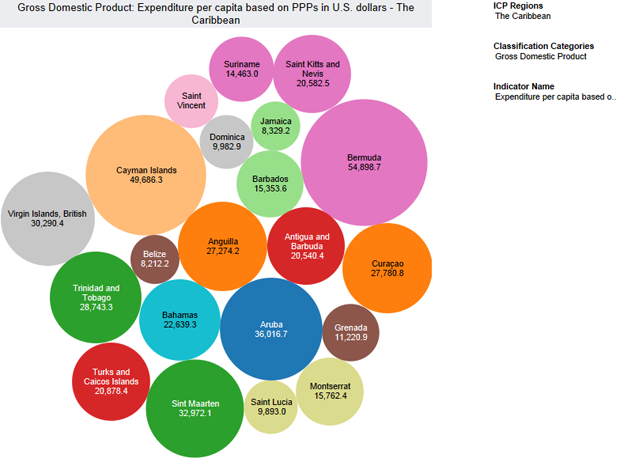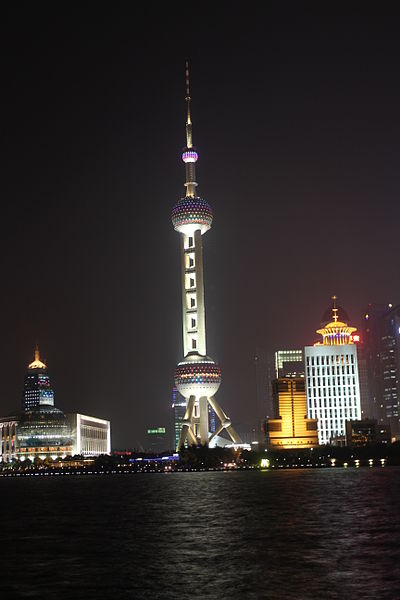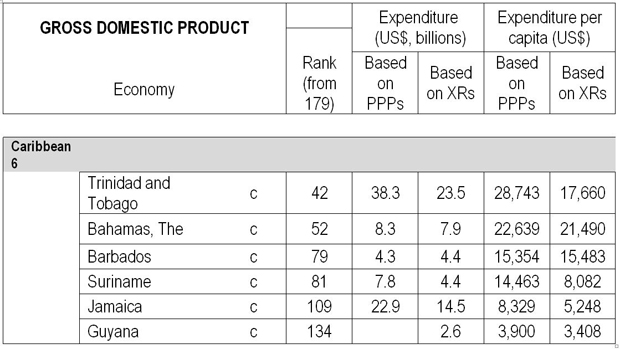
How Rich are the Caribbean Countries if Compared Globally?
December 19th, 2014
by Valerie Anne Mercer-Blackman

Graphic courtesy of World Bank, International Comparison Program, a visual tool
The World Bank’s International Comparison Program (ICP) released its data recently, which uses the most thoroughly developed methodology yet to compare the income of 179 countries in 2011. This is the first time the Caribbean countries participate in the exercise. The program constructs GDP from detailed expenditure data for all countries using the so-called purchasing power parity (PPP) exchange rate. This is different from the regular market exchange rate in that it prices all detailed expenditures across countries at the same ‘international’ price. As a simplified example, haircut services, which are generally cheaper in developing countries (because wages are lower and they are not traded), would be priced at the average global international price for haircuts in all countries. Consequently, haircut expenditures in poorer countries would generally tend to be higher if valued at PPP exchange rate than if they were valued at the market (US$) exchange rate.

photo by, Haotian0905, photo courtesy of Wikimedia Commons, User, Rotatebot
The big news is that China’s economy in 2011 was 87 percent the size of the U.S.’s, according to the exercise’s results. Furthermore, given current prices since 2011, it will mean that China will overtake the US to be the world’s largest economy by the end of 2014 in PPP terms. This reinforces the importance of more engagement of the Caribbean with China.
Not surprisingly, the results also reflect the big increase in wealth for oil and gas-producing countries.
Table 1 shows the results for the six Caribbean Department’s countries. Trinidad and Tobago’s per-capita GDP (in PPP terms) is US$28.73 thousand, ranked 42 out of 197 countries, topping our list. The Bahamas is ranked 52nd at US$22.7 thousand, and Barbados is a distant third, ranked 79th, with income levels close to Suriname (column 4). The numbers for Guyana are ICP estimates since they did not participate in the full exercise. Guyana would have been ranked 134th.
Source: World Bank 2011 International Comparison Program
Tags: Caribbean, GDP, International Comparison Program, purchasing power parity, World Bank
The Gleaner reserves the right not to publish comments that may be deemed libelous, derogatory or indecent.
To respond to The Gleaner please use the feedback form.
5 Responses to “How Rich are the Caribbean Countries if Compared Globally?”
- Three ways the Caribbean can strengthen financing for private companies
- Learning about Jamaica’s Forests by Hiking the Blue Mountains
- Making People Happy
- US Supreme Court: One Less Known Example of How a Supreme Court Decision, Shapes Up Judiciary Reality in the Caribbean
- Crime in Paradise: Preview of Forthcoming IDB Study on Crime in the Caribbean
- Caribbean Diaspora: How Can They Finance Development in the Region?
- Zika Virus and the Economic and Human Reproductive Health Implications for the Caribbean
- Proper Solid Waste Management Involves all of us
- Victimization surveys: 3 common mistakes to avoid
- Social Innovation: The way forward for Civil Society Organizations



I’m very sorry to read that Jamaica is so low on the “totem pole, just ahead of Guyana which is in last place. I know they work very hard and try their best to uplift the country. I know its a matter of education, education, education and applying this through determination, passion, trust in God and the knowledge
that He wants us all to be the best that we can be.I am a Jamaican by birth and remember the days of the one room school house and learning from teachers under Calabash trees. God guided me through this to St. Hugh’s
School, UWI and a PhD at the University of Chicago. I listened to that inner voice deep inside of me always, particularly as I walked across the UWI campus to classes. I was never alone, He was always with me. Believe in Him deep in your heart and you will always be a winner. Caroll Henry.
Well, congrats to Bermuda, which is indicated above as having a GDP of $54,898.7
There is only one problem: Bermuda is NOT in the caribbean sea. It is not even close. It is in the middle of the Atlantic Ocean.
One more thing!
Sorry to be so fussy about such minor details….however Suriname is a country in South America, bordering the Atlantic Ocean. It is a country on the northeastern Atlantic coast of South America. It is bordered by French Guiana to the east, Guyana to the west and Brazil to the south. It is no where near the Carribean !!!!!!
Comparing it with the rest of the islands named above….makes no sense at all.
To Caroll Henry:
Unfortunately high literacy rates and university degrees do not necessarily mean a country is prosperous. If there is no money for business, commerce, industry, then there are NO jobs. And the educated people who have the opportunity to leave for a developed country will leave! A government’s “hard-work” is to attract foreign capital investment, and get top dollar globally for her local products such as bauxite, sugar , bananas citrus, etc. even tourism. When we gained Independence in the sixties we had the opportunity to become as great as Singapore is today. We have been betrayed by our politicians from the get-go.
Much ado about nothing. PPP will never be more than half the picture, if even that, especially for a smaller country like Jamaica. Nominal valuations will always be more important because no country produces everything it wants to consume, with the caveat that China and the US come the closest to that possibilty. China is still relatively poor,yet according to the PPP they have now surpassed the US, but the US is the benchmark, so PPP is always equal to nominal GDP. As such PPP will always give China the rosiest picture and the US one of the worst. China is insulated, trained to not want more than they produce and indeed instead focus on overproducing things for export, unlike Americans who gobble up almost all of what they produce AND another 10% of what the entire rest of the world produces. Regarding the Caribbean, Barbados, Trinidad and Bermuda make much more than Jamaica in real terms, but it’s just that the things they produce, namely housing, health, services, government and education (being the bulk of what any country produces and then consumes equally) are the same cost as in the US(meaning the people involved in these fields get the similar pay), while in Jamaica they are much cheaper when compared to expenditure on imported consumer items like vehicles and electronics, which therefore means those three countries are better able to afford those imported items as well as abroad based things like foreign vacations, but the PPP fails completely to reflect this.